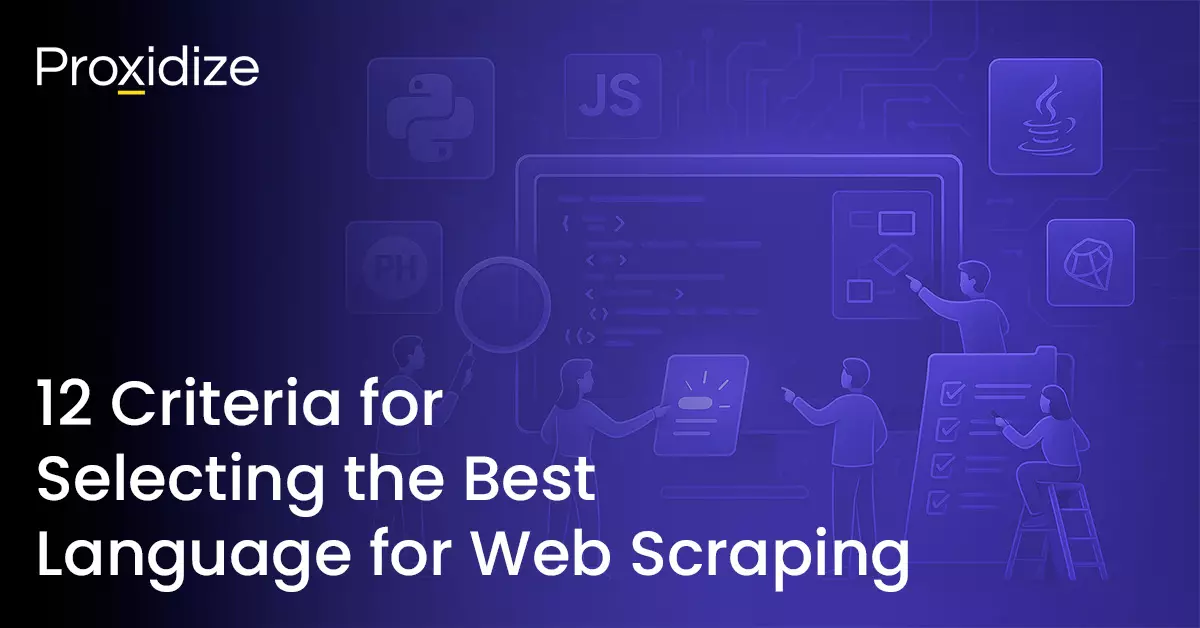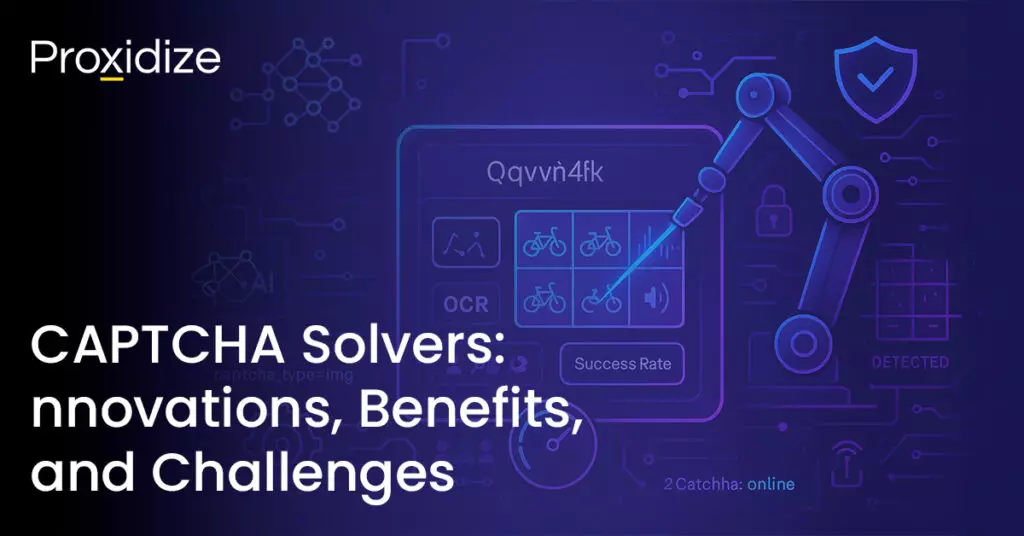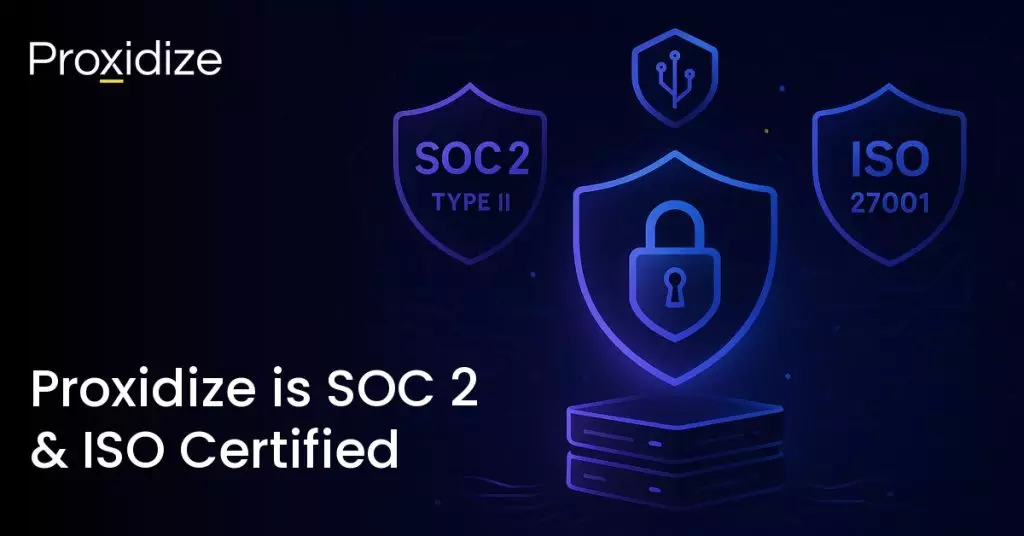Finding the best language for web scraping is a challenging task as there are many languages out there to choose from. Each language has its own level of difficulty, from Python to JavaScript to Ruby and even just Java. Picking the best language for web scraping can make or break your project’s success. As such, we will be exploring some key factors you should consider for what the best language for web scraping might be for you.
Web scraping projects have different strategies depending on the size and complexity of the project. Picking the best language for web scraping will save you countless hours of trial and error before finding the one that fits best for you.
We will be discussing the technical requirements, development resources, and maintenance needs that will help you make the right call. For the purposes of this article on the best language for web scraping, we will be covering Python, JavaScript, Ruby, and Java. There are many programming languages available for web scraping so if the options we provided are not intact with your project, please explore any of the others.

Understanding Your Web Scraping Requirements
Before you start looking at the different choices available to you, there are a few prerequisites you have to keep in mind. The size of your project, the type of website you wish to scrape, and how you expect to save the information will all be important to know and understand before picking the best language for web scraping. Sometimes, the most popular choice of programming language might not be the best one for you.
Scale and Complexity of Scraping Needs
Web scraping projects can range from simple data extraction to complex, large-scale operations. A reliable solution becomes essential if you plan to scrape hundreds or thousands of websites. Take a look at your needs; will you extract data from just a few pages or build an expandable system that processes huge amounts of information? If it is a larger-scale operation, Python might be a good bet as its built-in library Scrapy is built specifically for heavy lifting. However, if your project is smaller, Ruby’s readability might be a safer bet.
Type of Websites To Be Scraped (Static vs Dynamic)
The best language for web scraping will depend heavily on if the website you decide to scrape is static or dynamic. There are two main types of websites that exist on the internet. They are static and dynamic websites. Static websites are standard pages with fixed HTML content. Dynamic websites are pages that create content through JavaScript and need more advanced scraping methods. This is because dynamic websites load content asynchronously. For this, browser automation might be necessary to access all the available data.
For a static website, Python’s BeautifulSoup or Ruby’s Nokigiri will work through HTML much easier than other languages. For dynamic websites, JavaScript would be the better choice as its Puppeteer tool will come in handy when dealing with asynchronous content.
Data Processing and Storage Requirements
Handling data is the last important part to think about during the preliminary stage of choosing the best language for web scraping. The right language should match how you process and store scraped data. Some of the best languages for web scraping tend to work better with databases for structured data while others work better with NoSQL solutions for unstructured data. Python’s pandas library is great for crunching numbers and analyzing large databases. JavaScript’s JSON plays nicely with NoSQL databases. Java’s ORM framework makes it great for projects that need to interface with relational databases. Ruby’s Active Record pattern is perfect if you need to map scraped data to database tables easily.

Evaluating Technical Capabilities
Your web scraping project’s success depends on strong technical capabilities. You need to think over several key technical aspects that could affect your project’s outcome while choosing the best language for web scraping.
Available Libraries and Frameworks
A programming language’s ecosystem of libraries and frameworks determines its web scraping strength. Python leads the pack with its complete collection of libraries. Beautiful Soup and Scrapy are great examples that help extract data efficiently. Node.js developers can use powerful libraries such as Puppeteer and Nightmare that work well with dynamic content. Here are some notable frameworks for the best languages for web scraping.
Python has BeautifulSoup for simple parsing and Scrapy for larger operations, JavaScript offers Puppeteer for browser automation, and Cheerio for jQuery syntax. Java has JSoup for efficient data extraction and Selenium WebDriver for complex automation. Ruby has Nokogiri for XML/HTML parsing and Watir for cleaner syntax for browser automation.
Performance and Speed Considerations
Your choice of one of the best languages for web scraping could substantially affect scraping efficiency. Python’s asyncio rich library can handle multiple requests, making it great for I/O-bound scraping tasks. JavaScript uses its event-driven architecture to handle concurrent scraping jobs. Java is typically slow but with its multi-threading capabilities, it can scrape fast when properly optimized. Ruby balances performance and usability for small to medium-scale tasks.
Memory Management and Efficiency
Stable scraping operations need efficient memory management. Large-scale scraping projects need careful attention to how each language handles resource allocation. Python provides reliable memory management tools. Java has robust memory management but requires a bit more attention to detail to avoid memory leaks. Ruby’s garbage collector improved over the years and is more competitive. JavaScript handles memory efficiently for asynchronous tasks but careful coding is needed to avoid memory leaks in larger scraping projects. Your scraping performance will improve if you implement proper cleanup procedures and resource disposal mechanisms to prevent memory leaks.

Assessing Development Resources
Your development team’s capabilities and available resources determine the success of web scraping projects. The choice of best language for web scraping depends on several factors that you need to assess carefully.
Team Expertise and Learning Curve
Your language choice should be based on your team’s programming knowledge substantially. Python gives developers a gentler learning curve and remains available to beginners while offering advanced features to experienced developers. JavaScript is a bit more advanced but should be easy to learn how to scrape with once the basics are covered. Java’s structure and type safety can be perfect for large and complex projects. Ruby is fun to work with and has clean and readable code.
Development Timeline Constraints
The language you pick depends heavily on your project timeline. These resources affect the speed of development:
- Development environment setup time.
- Library implementation complexity.
- Testing and debugging requirements.
Large-scale operations need sophisticated infrastructure and expertise, which directly affects your project’s complexity. Python’s libraries can get you scraping in no time. JavaScript allows for rapid prototyping and iteration. Java’s setup could take some time but the maintainability is worth it for long-term projects. Ruby had a nice balance of convention over configuration approach speeding up development.
Available Documentation and Community Support
A strong community and detailed documentation can help speed your development process. Community support is vital because, with active forums, there will always be someone around to assist you with any blockers. Some of the best languages for web scraping have a community of users that provides valuable documentation and tutorials. Python has one of the largest communities for developers, JavaScript’s active community is ever-evolving with new tools and libraries constantly popping up, Java’s documentation is thorough and professional, and Ruby has a small but supportive community but it is tight-knit and incredibly helpful.

Analyzing Long-Term Maintenance
Your web scraping infrastructure needs ongoing maintenance to stay sustainable and successful. Several critical factors play a role in this process.
Scalability Potential
Python’s simplicity makes it easier to scale up from small scripts to larger systems. JavaScript can scale horizontally with ease, especially in a Node.js environment. Ruby’s simplicity and libraries (referred to as gems) make it a stronger choice for scaling smaller scraping tasks to distributed systems with manageable complexity. Java’s frameworks and multi-threading capabilities make it a reliable choice for scaling large, resource-intensive web scraping operations.
Code Maintainability
A systematic approach keeps your web scraping code running smoothly. Some key maintenance practices to follow are keeping regular workflow reviews, automating monitoring of website structure change as some website changes will affect the functionality of your code, keeping detailed documentation of all updates, and keeping up with continuous validation checks for data accuracy.
Python’s readability makes it easy for your or your team to understand the changes being made. JavaScript’s functional programming features can lead to clean, maintainable code when used correctly. Java’s principles make it easy to refactor and maintain large codebases. Ruby’s expressiveness allows for writing self-documenting code which many have found a joy to maintain.
AI-powered tools can improve your maintenance efficiency by predicting website changes and fixing inconsistencies automatically. This proactive strategy prevents common problems that could break your scraper as time passes.
Future Compatibility Considerations
Your web scraping solution must adapt to new technologies and challenges. The tech industry faces substantial rapid changes and several trends shape what is coming next. A few of these trends include AI and browser fingerprinting becoming an industry standard, increased implementation of anti-scraping measures, growing focus on mobile app data extraction, and more content being moved behind login pages.
To subvert these issues, you must design your web scraping solution with flexibility to ensure future compatibility. A two-stage selector approach could work well with one stage checking the page structure while the other stage handles data extraction. This will protect your scraper from major page changes and keep data collection reliable.
Another major obstacle you might come across is the risk of having your IP banned. To circumvent this, it is recommended to use a mobile proxy which will give you a new IP address that could be rotated in intervals. This will prevent your scraping actions from being seen by the website and keep you anonymous. Similarly, you could use an antidetect browser or a headless browser which will spoof your device and browser specifications, proving you with an added layer of security and anonymity, meaning that if your scraping script gets detected, you could revamp it and test it out again on a different browser and with a different IP without negatively affecting your host device or browser and real IP.
Python has a strong backwards compatibility which means your code will be less likely to break. JavaScript offers rapid evolution and is at the forefront of web technologies when compared to other best languages for web scraping. Java has a “write once, run anywhere” philosophy which helps in creating scrapers that can run on various platforms with only a few tweaks. Ruby has a heavy focus on developer happiness which translates to smooth version transitions and long-term support for popular libraries.
Conclusion
Your project’s success depends on picking the best language for web scraping. Python’s extensive libraries, JavaScript’s dynamic content handling, JavaScript’s dynamic content handling, Ruby’s elegant syntax, and Java’s robust framework in handling complex, high-volume operations, all provide a litany of benefits for any scraping project size.
The project requirements, team expertise, and long-term goals should be arranged for your choice. You must think about the scale of data extraction, website complexity, and available development resources in order to choose the best language for web scraping for your specific project. Take note that scraping success goes beyond the original implementation as proper maintenance, scalability planning, and future compatibility are significant factors for lasting results. A full picture of your specific needs and technical requirements comes first. You can match these against each language’s capabilities, available libraries, and community support. This practical approach helps you build a reliable web scraping solution that delivers consistent results and adapts to evolving web technologies and challenges.




